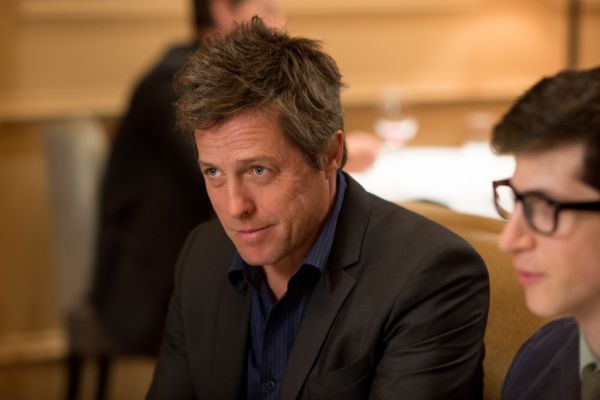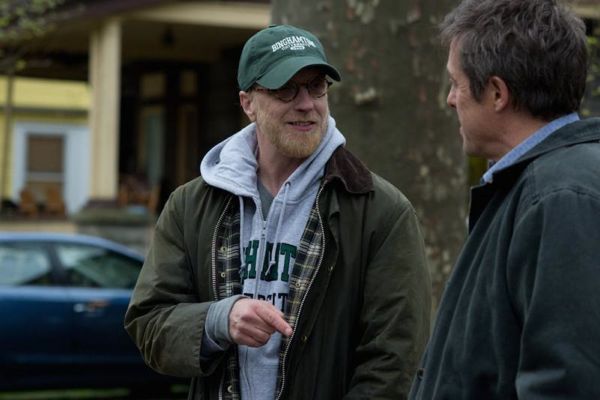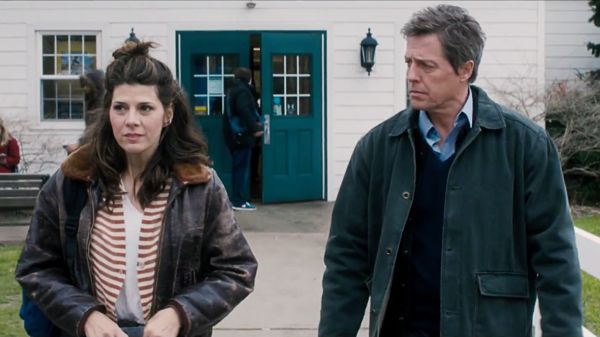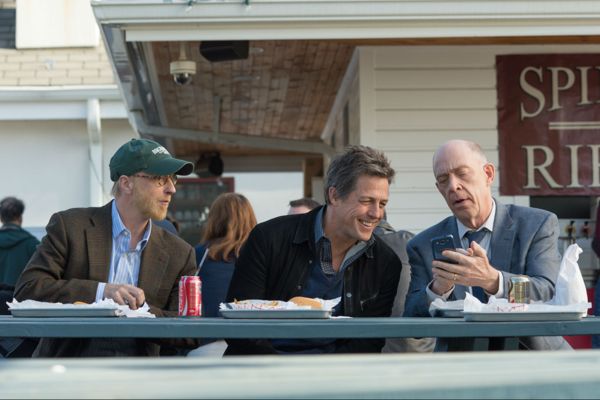Hugh Grant, Chris Elliot and Director Marc Lawrence Talk New Movie THE REWRITE
- Details
- Category: Interviews
- Created: Thursday, 19 February 2015 13:22
- Published: Thursday, 19 February 2015 23:07
- Written by Justine Browning

In Hugh Grant's latest movie, the British actor plays an Oscar-winning writer on a break from Hollywood in THE REWRITE. Hugh Grant reteams for a fifth time with director Marc Lawrence in the film that finds Grant escaping from a career slump to an East Coast college to teach screenwriting when he falls for Marisa Tomei.
Grant, Lawrence and THE REWRITE co-star Chris Elliot talk about the film in this Q&A.
Q: Chris, you’ve been thought of as more of a comic personality but you also can do a lot of other things, and Hugh you’ve always been caught between certain comic roles and certain serious roles. How did you guys decide when you think something works for you, you know, when it's got a comic and a serious side, and what kind of balance do you like to strike so that you get a chance to maybe flourish in either way?
CE: Well, I’ll speak for Hugh here. With me I honestly feel like I have spent the last ten years of my career trying to get smaller and smaller with what I do comedically and I think that’s been noticed a little bit, and so I’ve been able to move from doing kind of the goofy, crazy stuff that I was known for doing in the 80s and early 90s into maybe doing something where I'm a little bit more believable. I never thought I was a believable actor; I always thought I was just this goofy guy.
There are comedians that I believed on camera — I believed Robin Williams, Steve Martin, Bill Murray. I never believed myself when I was actually trying to act and so it’s taken me a while to find that balance–I think I did in this movie and I think it's because of working with Hugh and with Marc who keep the reigns pulled in pretty tight. That's it for me. Thank you, folks.Q: I don't know, I believed you in Groundhog Day very much.
CE: Oh, I was so stoned.
Q: Hugh can you talk about striking that balance particularly in this movie?
HG: Well, I can only really vaguely perform in a sort of light comedy tone. I've tried other tones and it’s a disaster. So I’m sort of more or less stuck there; having said that I did attempt to render some emotions in this film and at least I tried. I tried.
Q: I’m curious. There are so many actors and directors now teaching master classes. So, was that the inspiration for this and did you, Hugh, go to a college and sort of follow a teacher and do any kind of fun stuff like that? Have you ever learned from a master class so to speak?
HG: No, I’ve never been to one of those. I did get persuaded by a pretty girl to give a master class at some college in acting. Who'd have thought? I thoroughly enjoyed it. I liked the power trip and I liked exploiting the students.
Q: What it was like working with and also writing for a generation that's technology obsessed and Hollywood obsessed. You don't do a lot of movies that are a love story between students and an art form?
ML: For me it’s actually watching my kids—Clyde is 21; he's a senior in college and he also wrote the score to the film, and my daughter Gracie is a senior in high school and I also have an 11 year old. So watching them was the best education for me. Even some of the things like when Bella Heathcote who plays the student that Hugh’s character has a relationship with, some of what she said was stuff I find Clyde and his friend at school there's a lot of like: 'I’m totally down with that’. ‘Down with that' is big — 'word' has made a resurgence, like I'll say to you, like 'So I’ll see you later.'
ML: It was honestly through observing them and how they talk and this going on in every conversation that I thought kind of connected and because I go to visit—I haven't been to Binghamton a lot but I'm at his school a lot visiting him and seeing his friends and seeing my daughter in high school and her friends, so I was around it enough to sort of peak and watch and listen when I could, so I was hoping that kind of kept me writing what folks sound like now as opposed to when I was their age.
HG: But I sometimes wonder if one could anymore make a romantic comedy because I don't think people under 25 or under 30 maybe talk much—I mean how would you do it?”
CE: You mean the person texting?
HG: When I meet young people, they frequently say: “Can I get a picture; can I get a selfie?” And sometimes I'm not in the mood and I say “well, I don't really want to do a selfie but I'll have a chat with you” — “But what about a selfie?” “No, we could just meet, where are you from?” “But what about a selfie?” And there's sort of a desperate look in their eyes. It's a strange set of…
Q: This question is for Hugh. This is a comedy but there is a somewhat more serious subtext, however satirical, about creative freedom vs. creative control in Hollywood or meaningful art. Did you relate to that personally in your own career?
HG: I’ve never had any standards in particular. I’ve just thought: 'Did this thing make me laugh? Do I get bored reading the script? And if I didn’t get bored and if I did laugh and I thought it came into that narrow little area where I might be able to perform it, I've always said yes—I’ll tell you what I am quite proud of actually: since 'Four Weddings and a Funeral' I’ve never done a job just for money; I've always thought I liked it whereas before Four Weddings and a Funeral I only did jobs for the money.
Q: You've spoken about not confusing celebrity with self worth in the past, so I thought that was a theme in this, too, so is that something that appealed to you?
HG: Well I suppose it did. I like the way my character learns that there are other metrics by which to judge yourself from than money and how much your wanted in one particular trait. Suddenly, he realizes that he’s wanted by his students; he’s valued by them and by the university and I think that’s rather touching. It's been a huge surprise to me that with my children, they value me despite the fact that I don’t make many films anymore and waste my time doing politics and stuff—they just like me anyway and that’s rather like what happens to Keith.
Q: Hugh, I thought you and Marisa had really nice chemistry in this — can you talk about working with her?
HG: Well, I was frightened of her. I'm still frightened of her because she's so good and so much the opposite of me in terms of how she comes at a role—you know, she’s a proper New York method actress, so she knew exactly why she said every line she said. I'm probably not quite that bad but she’s really, really into all that stuff and one does sometime rolls one's eyes when it’s 4 in the morning and you’re very cold and she’s saying: 'But why do I say this line?’ 'Oh ‘cause then we can all go home.' But it does pay off for her; she is brilliant.
Q: So this film was shot at Binghamton. Is that the college or…
ML: No, we only shot at Binghamton for 4 days. I would love to have shot the entire thing there but in the bizarre world of movie economics it was actually financially prohibitive to go up there with a 150 people for 2 months because it’s not a film hub, so we would have had to have brought everything with us.
ML: It would have strangely have been very expensive to go shoot in a place where I mean, for the average meal in Manhattan you can buy most houses in Binghamton. So it's strange—so we shot there for four days.
Q: So what was the university feel like? I mean, how did they welcome you, what challenges did you face?
ML: Chris wasn’t there but Hugh and I were in Binghamton this weekend for the Binghamton premiere and it is a bizarre experience I would say to watch your movie where any—they didn't even really need sound but any mention of Binghamton would get pretty much or close to a standing ovation from 1200 people — it's the biggest theatre I've ever had a movie shown in and if they saw something they recognized [there were] huge cheers.
So I don't know what they thought of the film but they were very, very energized and I think when you live in a place like that you’re so starved for any version of attention that you can’t believe that’s your town up there. And I loved it up there; I went to school there and I loved it; I met my wife there and most of my best friends. But they were thrilled and they would have been happy had we been able to spend the whole time.
CE: Sorry I missed that; I didn't seem to be invited to that one.
Q: One of the funniest parts of the movie is Marisa showing up in different places having different jobs just to survive. For all of you was there any time in your own careers where you had to do a lot of crazy jobs just to survive?
CE: Unlike Hugh, I still do work for the money. I’ve actually been so lucky to go from one thing to another; my first job was working for Dave Letterman and I worked there for 8 years before I had my own TV show and then a movie.
I have done some horrible movies for a quick buck but my crazy jobs weren’t even “that crazy”. I was a tour guide at Rockefeller Center and then a PA and a runner on a couple of TV shows. So I didn't really have to stretch that, so right now like everybody, the times in this business have changed and the numbers have gone down, especially for people like me in the business. So I still try to be certainly choosy and the idea of working with these two guys was too much to turn down, so I really did it for below what I usually get paid.
HG: Well, I’ve cleaned a lot of lavatories.
Q: Get out.
HG: Yes, I have. And I was rather good at it but I did hate it. I remember I was cleaning lavatories at IBM in London and I was on my way to work one day and I thought I really can’t stand this another day. I wish the place would just burn down. And as I turned the corner, it was burning down. And I didn’t know I had that power, and I've tried not to use it too much since, yeah.
HG: I delivered new cars—in those days it as very important that you had to run them in slowly, so we were told to drive them at 20 mph. And we drove them at, 120 mph. And I crashed one and was fired from that job. I don't know. I was a very good waiter in a gay restaurant at Kings Road and I got a lot of tips because I was very flirty. And I wiggled my bottom.
Q: So this is a gay restaurant, like straight people are not allowed in there?
HG: No, it would just happen to have a very large gay clientele. And uh, I wiggled my bottom and...
Q: You seem to collaborate, like you find that actress you'd like to work with over and over again. Is that because through your process you've had these people in mind— people like Hugh or Sandra Bullock, what is it about that narrative that makes you want to work with them again?”
ML: I don’t like meeting new people. I almost never leave the apartment, so I live a kind of hermit life existence. And I actually do get comfortable around certain people. Like Chris and I had done something a time back and have always wanted to work again. I'm a creature of habit in every aspect of my life, it just so happens in this situation the people you're doing stuff with are the absolutely best at what they do so it all worked out.
HG: Marc has had the same lunch every day for what is it, 30 years?
ML: Yeah, Sandy always used to say: 'Everything you eat is white.' But I do like working with the same people. And also for the kind of stuff I write, which is way too many words. There's not that many people who really do it all that well, so when you find them you cling on.
Q: What do you think of the idea of rewriting your life?
ML: I think we’ve had more questions on that than whether or not we believe sort of what the movie says about it and I honestly don’t know the answer to that question. And what I like about aspects of the movie is that it raises that question and I don’t think it can ever definitively answer them. I think what I believe is, you know, if you don’t have an ear for music, I just don’t think any amount of time or focus or practice is ever going to compensate for that; if you do have an ear for music then I absolutely think you can get better, and I think that focus and hard work will do something.
Way back to when I started, which was on a TV show called “Family Ties” people would send scripts into us to read because they wanted to write for the show and so, and obviously if there were from writers you knew you were just reading to reevaluate the story set. But when you got scripts from people you didn’t know, we all felt we might have been wrong that within two pages we knew whether someone could do it— you might not like that specific story or whatever but it felt like it was clear whether they were writing on the level that we at least perceived or hoped that we were at.
I think that’s still true and I get caught up in debate, too. I think you need to have certain wattage on the light bulb in order to shine—but then I think that Marisa's argument in the movie that's it's about focus and hard work and whatever—you know l those geniuses—Edison—that it was 99% perspiration and 1% inspiration. I think that there's probably something to that.”
HG: Uh. What do you think, Chris
CE: Well, I’d like to think that you can. Even that first question that you asked, I think to a degree as a performer I’m trying to sort of recreate and restart and change that parameter. I’ve always wanted to paint and I can draw and I can do that kind of stuff. But I couldn’t start right now and be a painter I don't think—I could do it for the fun of it but I don't think I could actually go in and commit myself to a lifetime of doing that—at least not at my age. I think age does have a little something to do with it.
HG: I don’t know the answer to that, but we did have a crazy art teacher at my school who thought that art died in 1900 who was a great believer in the classical techniques, and he absolutely swore that he could teach anyone in the world to draw perfectly.
He used all of the old academic techniques: you had to draw a bowl with the right shading and a cone, and a pyramid and all these things. I think there’s actually something in that because the sort of flip-side of his argument is that maybe we all rely too much on inspiration. Actually, unbelievable hard work and application [of yourself] in learning a trade, that’s the equivalent of rebellion it’s just sort of like whipping the feet of the student, and it actually does produce beauty in the end and it’s very unfashionable.
CE: And the whipping is fun, too.
HG: Very fashionable, actually.


